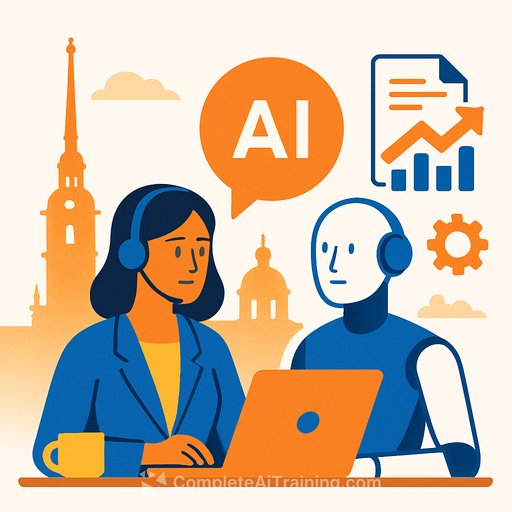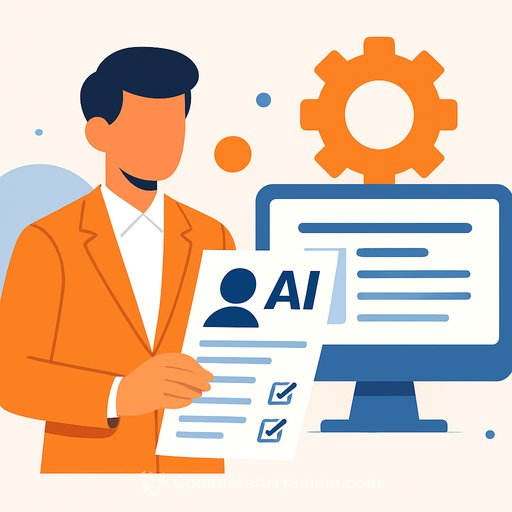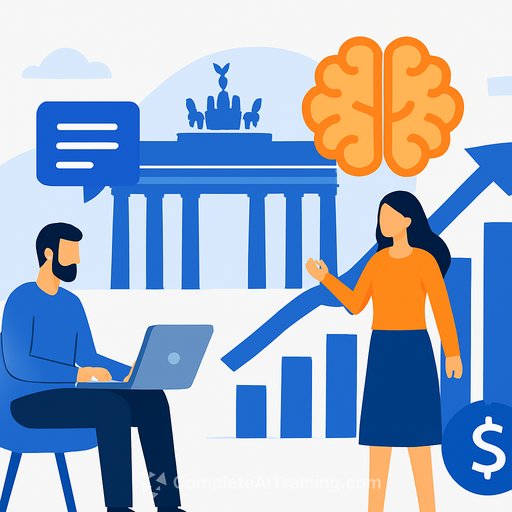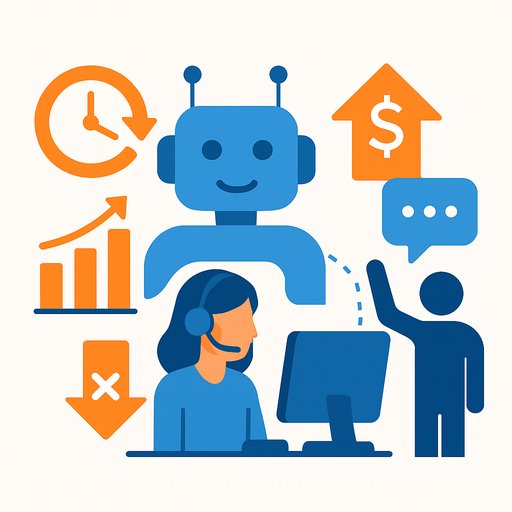The Complete Guide to Using AI as a Customer Service Professional in St Petersburg in 2025
Too Long; Didn't Read:
Generative AI in St. Petersburg (2025) can cut average handle time (AHT) from about 10 minutes to 5.4 minutes, lower costs by up to 30%, and enable 24/7 support. Start with a pilot on a high-volume task, track key metrics like AHT, First Call Resolution (FCR) of 70–79%, customer satisfaction (CSAT) around 78%, and expect solid ROI when using real-time agent assist tools.
Customer service teams in St. Petersburg, Florida, have a clear opportunity to boost capacity and efficiency with generative AI. Platforms like ASAPP GenerativeAgent provide real-time agent assistance, fast transcription, and post-interaction summaries that improve quality assurance and first-contact resolution. Meanwhile, local training programs such as those offered by St. Petersburg College and other bootcamps teach practical AI skills, helping customer-facing staff learn how to write prompts and build AI workflows that improve service and reduce stress.
What is the AI Program for Customer Service? (St Petersburg, Florida Context)
In St. Petersburg, AI programs in customer service mainly focus on virtual agents—advanced AI assistants that go beyond simple chatbots. These agents provide 24/7 support, automate routine tasks, and escalate complex issues to human agents. They use natural language understanding, machine learning, and backend integrations to handle tasks like pulling order histories or resetting accounts.
This approach allows local businesses and contact centers to expand support capacity without constant hiring. Many organizations find these virtual agents become their primary chat channel, reducing support costs by about 30% and speeding up issue resolution. For St. Petersburg businesses, AI means instant self-service for customers at all hours, lower per-call costs, and better data for spotting recurring problems.
Start by automating high-volume, repeatable requests before expanding to more complex tasks. A simple chatbot can handle FAQs, but a full virtual agent integrates with systems to complete actions and improve the customer journey.
Core Use Cases: Examples of AI in Customer Service for St Petersburg Businesses
St. Petersburg businesses benefit from AI in several practical ways:
- Virtual agents and helpdesk AI: Speed up routine transactions and provide 24/7 self-service for customers and visitors.
- Supply chain management: AI tools linked to the Port of Tampa Bay help improve delivery reliability and reduce weather-related delays.
- Public safety: Indoor mapping AI turns old paper plans into digital guides for 911 operators to direct responders efficiently, crucial for downtown condos and waterfront venues.
- Healthcare: Generative models assist clinicians in spotting conditions like sepsis early, improving patient outcomes.
- HR support: On-demand AI offers resume and interview coaching to help local teams stay prepared and adaptable.
These examples show AI working alongside people to improve service, safety, and employee readiness.
Will AI Replace Customer Service in St Petersburg? Realistic Expectations
AI will reshape customer service roles but not replace them. It automates routine, data-driven tasks like ticket triage, freeing human agents to focus on empathy, complex problem-solving, and relationship building. Hybrid workflows improve speed without sacrificing quality.
Businesses should pilot AI on high-volume tasks and measure results like AHT and FCR. Combining bots with trained agents for escalation ensures customers get quick answers without losing the human touch on sensitive issues.
How to Build an AI Customer Service Agent for a St Petersburg Business
Start by selecting a narrow, high-volume use case such as order tracking or password resets. Map out the data and systems the AI will need to access—CRMs, ticketing platforms, and so on. Use no-code guides or work with local developers experienced in AI to build agents tailored to your needs and compliance requirements.
Set clear rules for when the AI should escalate issues to human agents. Test with live traffic, monitor conversations, and continuously improve through quality assurance. Begin with one channel, measure impact, then expand to more tasks.
Technical Patterns & Integrations for St Petersburg Customer Service Teams
Effective AI in customer service relies on combining language models with live, authoritative data. Retrieval-Augmented Generation (RAG) pairs vector or semantic search with large language models to provide accurate answers based on company documents, CRM records, and ticket histories.
Typical patterns include:
- Simple RAG for FAQ automation
- RAG with session memory for personalized multi-turn conversations
- Hybrid RAG routing queries to specialized knowledge bases
- Agentic RAG for multi-step workflows calling APIs (e.g., order updates, refunds)
Data privacy and compliance (HIPAA, GDPR) are critical in healthcare and HR contexts. Use confidence scoring, human-in-the-loop reviews, and reranking techniques to reduce errors and maintain trust.
KPIs, ROI, and Pilot Strategy for St Petersburg Companies
Start by tracking key performance indicators (KPIs) before and after AI deployment:
- First Call Resolution (FCR): Aim for 70–79% to reduce repeat contacts and lower costs.
- Customer Satisfaction (CSAT): Target around 78% as a benchmark for service quality.
- Average Handle Time (AHT): Reduce from about 10 minutes to free agents for complex tasks.
- Service Level (ASA): Aim for 80% of calls answered within 20 seconds.
- Abandonment Rate: Keep below 6%, ideally under 5%, to avoid customer frustration.
- Program ROI: Studies show up to 210% return on investment from automation and agent assist.
Run pilots on one high-volume task, measure cost per contact and containment rates, and use dashboards to monitor progress. Pair bots with human agents to handle sensitive interactions.
Challenges, Compliance, and Best Practices for St Petersburg Customer Service Teams
AI tools come with risks like fabricated answers or biased responses. Limit bot scope by excluding legal, clinical, or sensitive HR advice. Ground AI responses using RAG and fresh, quality data sources.
Incorporate human review processes with confidence scoring so uncertain responses trigger escalation. Monitor hallucination rates and customer feedback regularly. Use technical guardrails such as prompt constraints and output filters to reduce liability risks.
Conduct pilot tests thoroughly before expanding AI use to ensure accuracy and compliance with local laws.
Tools, Platforms, and Pricing Choices for St Petersburg Organizations
Choosing customer service platforms depends on budget and scale:
- Freshdesk: Affordable, user-friendly, with Freddy AI built-in. Good for small teams needing quick start. Costs start at $29 per agent/month.
- Zendesk: Enterprise-grade, with advanced AI and analytics. Ideal for larger centers or regulated environments. Pricing begins at $55 per agent/month.
Retailers or hospitality desks downtown may prefer Freshdesk for its lower cost and ease of use, while larger contact centers benefit from Zendesk’s deeper customization and workforce management features.
Conclusion: Next Steps for Customer Service Professionals in St Petersburg, Florida
Approach AI with a clear, measurable plan. Pick one high-volume task, establish baseline KPIs (AHT, FCR, CSAT), and run a pilot combining a grounded virtual agent with real-time agent assistance. Monitor results carefully and iterate on knowledge quality.
Start small, embrace continuous measurement, and use AI to handle routine checks while human agents focus on complex, empathy-driven cases that build customer loyalty.
Frequently Asked Questions
What practical benefits does AI bring to customer service teams in St. Petersburg in 2025?
AI provides 24/7 self-service through virtual agents, faster transcription and summaries, reduced handle times, improved first-contact resolution, richer analytics, and cost savings up to 30%.
Will AI replace customer service jobs in St. Petersburg?
No. AI automates routine tasks but frees human agents to focus on empathy, complex problems, and relationship building.
How should a St. Petersburg business build and pilot an AI customer service agent?
Start with a high-volume, simple use case like order status or password resets, map data sources, apply grounding methods like RAG, set escalation rules, and run a pilot on one channel.
What technical patterns and guardrails should local teams use to keep AI accurate and compliant?
Use Retrieval-Augmented Generation with secure data sources, vector stores, and orchestration tools. Add human-in-the-loop checks, confidence scoring, and prompt/output constraints to reduce errors and legal risks.
What training and program options are available for St. Petersburg customer service professionals who want hands-on AI skills?
Local options include practical AI training programs that teach prompt writing and AI workflows in about 15 weeks, helping teams turn automation anxiety into service improvements. For more info on AI courses that can help customer service pros gain these skills, visit Complete AI Training.
Your membership also unlocks:





